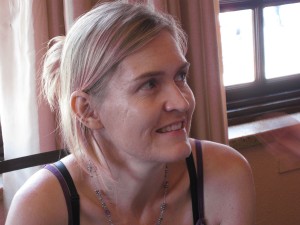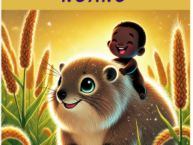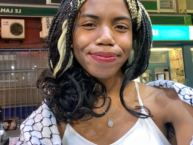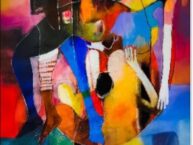After the 2010 publication of This September Sun, I interviewed the author, Bryony Rheam, for Moments in Literature. Since the book was recently published in the UK by Parthian, we are re-publishing the full interview here.
1. I just finished reading This September Sun and I enjoyed it a lot. You created an impressive character in Ellie. I also now know that the book is not autobiographical, but what inspired Ellie?
Although the novel is not an autobiography, it is autobiographical in many ways. I am very much like Ellie and there are parallels in the events in our lives. I don’t see her as myself though – she is a character in her own right.
2. I love the first sentence of this novel, but this question is about the ending. Is it reasonable for Ellie to expect to go back to Zimbabwe and find Tony waiting for her after all these years? Was it just a momentary epiphany, or a sudden realization that there could actually be alternatives to how she had thought she could dream? Or does it really matter what she returns to as long as she returns with a sense of hope?
The ending of the novel appears to be a ‘happily-ever-after’ one, but the more you think about it, the more you begin to wonder if this isn’t another of Ellie’s dreams – like her one of going to live in the UK. Will Tony be waiting for her or will he have met someone else? That’s up to the reader to decide. However, although Ellie is an idealist who will probably encounter many problems and frustrations on her return to Zimbabwe, the most important thing is that she is going back to Zimbabwe with a sense of starting over rather than dwelling in the past.
3. Readers of my age seem to connect with Ellie in that she speaks for our times. But how important was it to make her ignore the war? If she was six at independence, was she too young to be bothered about the vagaries of war? I know I wasn’t too young not to remember, but then I was in an area that continued to see the signs of war four or five years into the eighties. In other words, was the war as irrelevant as Ellie seems to imply?
I don’t think that Ellie sees the war as irrelevant; after all, it had such an impact on her family. What she despairs of is the tendency of the older generation to almost wallow in its pain and therefore refuse to move on. It’s a time in Zimbabwe’s history that people seem to have to constantly return to, whether they be politicians, writers or the average person on the street. That’s all very well, but what about now?
4. I know you have pointed out that this novel is a mystery/romance. But I think it turned out to be literary too. Do you care about it being considered literary? Or are those genre distinctions even necessary?
I am sure there are many ways in which the novel may be considered literary. I have actually discovered a number of things that may be considered symbolic, but that wasn’t my intention when I wrote the book. T.S. Eliot believed that the author’s intention wasn’t as important as the reader’s response and I go along with that. I’m glad that it can just be read as a mystery/romance because it means it appeals to a wider audience than a purely literary work would.
5. You have already been compared with Doris Lessing and because of that, I couldn’t help but look for traces of the The Grass is Singing. Is this a fair comparison?
I have great respect and admiration for Doris Lessing and yes, I think it is fair to say that her writing has influenced me a lot. I remember sitting in almost trance like state after finishing the last page of The Grass is Singing!
6. Which writers have influenced your writing? How many of these are Zimbabwean, or is this even relevant?
There are three books which I could read over and over again. They are The End of the Affair by Graham Greene (I consulted this book many times when writing Evelyn’s diaries), Mrs Dalloway by Virginia Woolf (I love the attention to the smallest detail) and Reef by Romesh Gunesekera, a Sri Lankan writer (politics are so much in the background here, they are almost non-existent, yet somehow you manage to feel its effects in the lives of the characters). Funnily enough, I haven’t always liked other books by these writers.
7. There is always debate about whether one is or is not an African writer, and often, the debates are fraught with misunderstandings, leading to unnecessary controversy. Do you consider yourself an African writer? And what does this mean to you?
This is one debate that will go on for eternity! I think I’d just like to call myself a writer actually. I don’t see any need to be anything in particular, even if I do live in Africa.
8.There are some subtle meta-fictional elements to This September Sun (which I enjoyed, by the way). How important was it for you to present Ellie as a writer? As I read the story, I enjoyed being aware that it was being written as I read.
I feel writing is a way of making sense of your life. Why, for instance, do people keep diaries? Both Evelyn and Ellie use writing for a number of reasons. One, as I said, is to make sense of their realities; another is to record it – both women want to be ‘heard’ by someone: Evelyn uses to diaries as a confessional and eventually leaves them to Ellie because she wants them to be read. Ellie feels constantly overlooked and therefore demands that the reader listen to her. However, as with all first person narratives, how far are they to be trusted? At times we see an incident from two different points of view, such as the time when Evelyn and Ellie visit Miles’s house. Which is the truth?
9. I read somewhere that you studied literature in college. How has this influenced your writing? You are also a teacher. Do you believe, as Achebe, that a writer is like a teacher?
Studying literature at university definitely influenced me a number of ways. I had to read a large number of books that I would never have chosen to read for a start! I also became much more aware of how vulnerable the writer is and how you have to constantly think about how your writing may be criticised, both positively and negatively – but this shouldn’t stop you writing. The biggest drawback about studying literature is that you always want to look deeper into something and I really resented the way some of my favourite texts were almost carved up and dissected. I got to the point where I just wanted to read for reading sake and to be entertained, but I don’t think you can ever do that again after studying literature! I did get frustrated when studying post-colonial litertaure because I felt that many of the white characters in much of the writing weren’t ‘real’. They tended to be limited to the District Commissioner or a policeman. Issues of identity and belonging were never seen as ‘white’ problems. I used to argue quite a lot during turorials, but I never really felt that I got the others to listen to me. I think everyone was too busy being politically correct! As for a writer being a teacher, I would hate to be didactic in my work, but I do think you can prompt the reader to look at a situation differently. How many times have you heard someone say, ‘this book changed my life’? Books can have a huge impact on people.
10. Your novel has been hailed as the first one in Zimbabwe to educate readers about the white world in Zimbabwe in the 80′s. I don’t know how true this is, but having studied Zimbabwean literature at the University in Harare, I was well aware of the absence of white Zimbabwean literary works on the syllabus. Do you think the makers of the curriculum deliberately left out these works, or the works were not being written.
I don’t think there have been many literary novels by white Zimbabweans. In fact, I can only think of Doris Lessing and possibly John Eppel. However, I do think that will change.
Yes, it was very difficult to ‘be’ Evelyn. Sometimes I thought she sounded too old-fashioned, like a character out of a Jane Austen novel. I also struggled to find her a place within England. Should she posh, upper-class or working class. I needed her to have a ‘neutral’ accent, because I would have found doing a broad Yorkshire accent or something similar very difficult! I had to be aware of the words I used in case certain expressions weren’t in use in the 1940s and also be aware of the era in general – what did women do and what didn’t they do? Getting the historical bits right meant a bit of research, but I enjoyed that.
12. What do you think of the future of Zimbabwean literature?
I think writers need to start to move away from the political, at least the overtly political. We need to write love stories and thrillers and mysteries, otherwise we will continue to go over the same ground.



